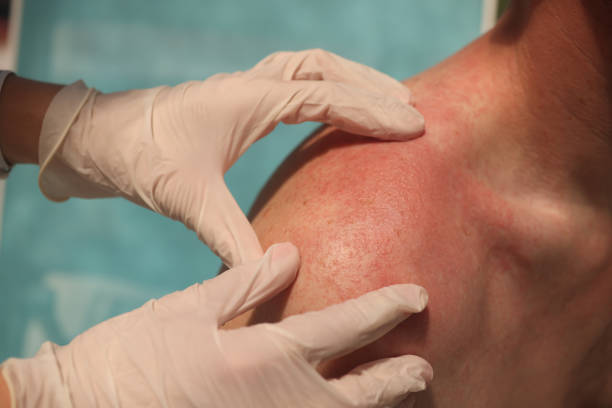Sunburn is a type of skin damage that occurs when the skin is exposed to too much ultraviolet (UV) radiation from the sun. It is a common condition, particularly in the summer months when people spend more time outdoors.

In this blog, we will discuss the causes, symptoms, treatment, and prevention of sunburn.
Causes of Sunburn
Sunburn is caused by overexposure to UV radiation from the sun. This exposure can occur from direct sunlight, but it can also occur when UV radiation is reflected off surfaces such as sand, water, or snow. The amount of UV radiation a person is exposed to depends on several factors, including the time of day, the season, the altitude, and the latitude.
Symptoms of Sunburn
The symptoms of sunburn can vary in severity, depending on the extent of the damage to the skin. Mild sunburn can cause redness, pain, and itching, while severe sunburn can cause blistering, swelling, and fever. Other symptoms of sunburn can include:
- Dry, peeling skin
- Headache
- Nausea
- Dizziness
Treatment of Sunburn
The treatment of sunburn depends on the severity of the condition. Mild sunburn can often be treated at home using over-the-counter remedies, while more severe sunburn may require medical attention. Some treatments for sunburn include:
-
Cool compresses: Applying cool compresses or taking cool baths can help soothe the skin and reduce pain and inflammation.
-
Moisturizers: Using aloe vera or other moisturizers can help to relieve dryness and prevent peeling.
-
Pain relief: Over-the-counter pain relievers such as acetaminophen or ibuprofen can help to reduce pain and inflammation.
-
Hydrocortisone cream: This cream can help to reduce inflammation and itching.
-
Medical attention: If the sunburn is severe or if the person is experiencing other symptoms such as fever or dehydration, medical attention may be necessary.
Prevention of Sunburn
The best way to prevent sunburn is to avoid overexposure to UV radiation. Some ways to protect yourself from the sun include:
- Wearing protective clothing such as long-sleeved shirts, hats, and sunglasses.
- Applying a broad-spectrum sunscreen with a sun protection factor (SPF) of 30 or higher.
- Avoiding the sun during peak hours of the day when UV radiation is strongest.
- Seeking shade whenever possible.
- Staying hydrated by drinking plenty of fluids.
There are some topical creams and lotions that can help soothe and heal sunburned skin. Here are a few examples:
-
Aloe vera gel: Aloe vera is a natural anti-inflammatory and can help soothe sunburned skin. Look for a product that contains at least 80% aloe vera for the best results.
-
Hydrocortisone cream: This over-the-counter cream can help reduce redness and inflammation associated with sunburn. It is important to use it as directed and only on the affected area of the skin.
-
Cool compresses: Applying a cool, damp cloth or compress to sunburned skin can help reduce pain and inflammation. Be sure to avoid using ice, as it can further damage the skin.
-
Moisturizers: Sunburn can cause dryness and peeling, so using a moisturizer can help soothe the skin and prevent further damage. Look for a product that is fragrance-free and specifically formulated for sensitive skin.
- Apple Cider Vinegar: Apple cider vinegar has anti-inflammatory properties that can help reduce redness and soothe sunburns.
It is important to note that these topical treatments should not be used as a substitute for proper sun protection. The best way to prevent sunburns is by wearing protective clothing and using sunscreen with a high SPF. If you do get a sunburn, take steps to treat the symptoms and avoid further exposure to the sun until the skin has fully healed.
Foods to Eat to Help Soothe Sunburns
- Cucumbers: Cucumbers are a natural source of antioxidants, which can help reduce inflammation, and they contain natural oils that can help soothe sunburns.
- Yogurt: Yogurt contains probiotics that can help reduce inflammation and soothe
- Oatmeal: Oatmeal can be used as a soothing bath treatment to reduce inflammation and itchiness.
- Potatoes: Potatoes contain natural enzymes that can help reduce inflammation and provide relief from sunburns.
Here are some of the most frequently asked queries about sunburns:
What causes sunburns?
Sunburns are caused by overexposure to the sun's UV rays, which can damage the skin cells and cause inflammation.
How long does it take for a sunburn to heal?
The time it takes for a sunburn to heal varies depending on the severity of the burn. Mild sunburns may take a few days to heal, while more severe burns can take up to a week or more.
How can I prevent sunburns?
You can prevent sunburns by using sunscreen with a high SPF, wearing protective clothing such as hats and long sleeves, seeking shade during the hottest part of the day, and avoiding tanning beds.
What are some home remedies for sunburns?
Home remedies for sunburns include applying cool compresses, taking cool baths, using aloe vera or other moisturizers, and drinking plenty of water to stay hydrated.
When should I see a doctor for a sunburn?
You should see a doctor for a sunburn if you experience severe pain, blistering, or if you have a fever or chills. These can be signs of a more serious burn and require medical attention.












